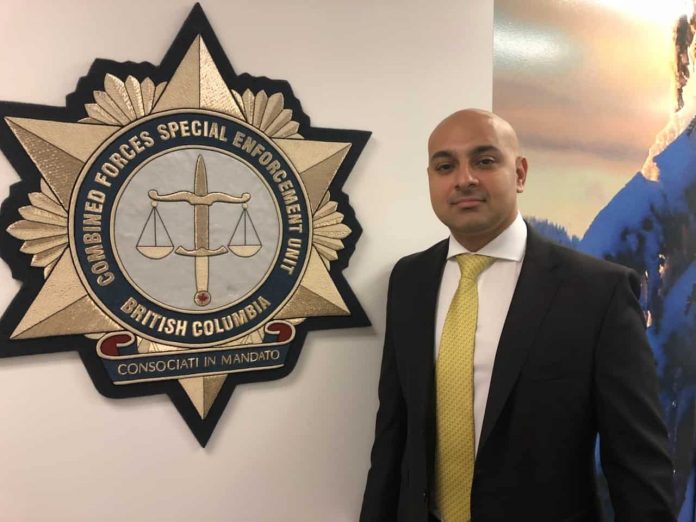BY RATTAN MALL
LAST year there were 49 gang nexus murders – 32 confirmed gang-related homicides and another 17 that had a nexus to gangs and gang activity – in the province.
This year, so far, that number is 28 – 14 confirmed gang-related homicides with a further 14 that have a nexus to gangs and gang activity.
“There has been a significant reduction in gang nexus murders across British Columbia – and a lot of it, I believe, is based on predictive intelligence and policing,” Superintendent Paul Dadwal of the Combined Forces Special Enforcement Unit – British Columbia (CFSEU-BC) told The VOICE this week.
Dadwal recently wowed hundreds of South Asians at an anti-gang forum in Surrey with his bold, blunt take on the disproportionate involvement of South Asians in gang violence and how police were successfully managing to get more and more people out of gangs.
Dadwal, who’s been a police officer for 17 years, seems to be just the perfect cop to take up this onerous challenge. He was born and raised in Surrey and went to Tamanawis Secondary School. His wife is a teacher and they both share the same goals in helping kids and parents overcome a criminal lifestyle.
Dadwal pointed out that the CFSEU-BC can’t control every shooting; however, they have specialized teams and task forces and they have partnered across the Lower Mainland on various projects. In one recent regional project where all Lower Mainland RCMP detachments and municipal partners participated, for example, they seized 150 guns and laid 92 charges, including charges on the suspects’ parents.
“So with our coordination programs and our joint forces operations and our specialized teams specifically looking at these groups, I have never seen anything like it in my career in almost two decades,” said a confident Dadwal.
“We are mixing intervention and gang enforcement and investigations specifically on some of these South Asian groups to target them, but at the same time the ones that want to leave, that want to exit, we are putting our hands out to help them get out. And the ones that don’t want to exit, well, we are going to hold them accountable,” he warned.
When I asked Dadwal about the challenge of keeping tabs on South Asian and other gang members because of constantly changing loyalties, he said: “I think it was more like that before. Truthfully, we have a very good understanding of what the groups are, who is in the groups, who their associates are.”
Dadwal pointed out how we are very proud of being South Asians and added: “I think a few hundred kids and their associates have wrecked it [the community’s reputation]. So at the end of the day, for us not to know who those few hundred people are, I would be lying to you. We know who they are… We know their associates. We know where they live. We do curfew checks on them. We watch them. We’ve never seen as much intervention and as much enforcement focussing on these groups ever in my entire career.”
During a discussion on solving of murders, Dadwal pointed out: “People said for so many years the community is not talking to us, people are not coming forward, people don’t talk. I can tell you right now, I disagree. So at end of the day, people do talk to us, they are coming forward, we have more people talking to us than I’ve ever seen before.”
Dadwal stressed the enormous effort the police forces are making to deal with gang violence: “Every year you see more and more effort. This year, every two weeks, the leaders across the entire Lower Mainland – inspectors and above – and analysts get on a phone call to discuss files, investigations, who to target, who is a priority, what’s the update in a shooting. You have all the analysts that get together to break down every single file. You have all the uniformed teams speaking on who to target. You have predictive policing. There’s so many things going on now that I am hopeful, especially me in this new role, that we will actually … reduce it. That’s my goal and I am not going to look forward to five or 10 years from now. I want to work hard on it now.”
[The five to 10 years was the prediction I had made to Dadwal at the start the interview about the length of time it might take to control gang violence.]
ROLE OF PARENTS
Dadwal tackled the role of parents head on at the forum.
And he was brutally honest to let the facts sink in deep so that the community members could be left in no doubt as to what was the reality of the situation.
He told me: “There were a lot of questions asked about why does it happen in the South Asian culture – how can it happen more in our culture than in all the other cultures?”
He added: “For me overseeing all the investigations … for me being involved in numerous wiretap investigations where we actually get to listen behind closed doors of family members knowing what’s happening in the house, I said I had a pretty good understanding of why I believe our community is disproportionate statistically in terms of violence. It’s a fact.”
Parents later approached him to talk about the matter.
Dadwal explained: “There are two schools of thought on parents. One is that parents are victimized. … In many of these investigations specific to our culture parents have a spouse that might be an alcoholic or suffer from withdrawal and at the end of the day what happens – in that school of thought – is that the kids take over the household, the parents become victims and the kids end up running the house. The kids end up causing damage in the house, fight and swear with the parents, they have even pulled guns on their parents. Sadly, in these cases the kids have now become the gatekeepers of the house. I would love to solve this problem as this would bring peace to the respective parents, community and the police. The parents won’t kick them out because they don’t want to lose their kids. That’s one school of thought and that’s absolutely the truth and we unfortunately see that time and time again.”
The other school of thought was that for some of the parents in these specific cases have actually gone through a very rough journey themselves. Sometimes you have single mothers that were emotionally or physically abused and are working many jobs just to get by. They don’t have much family or access to a network that can see their kid’s criminal indicators. By the time they figured out what was happening, their kid was already running the house. It’s a sad situation that bothers Dadwal.
There were the usual indicators – the bags, or the cell phones or the inconsistent behaviour or the strange friends coming by and the anger and the rage – but then it was too late.
Dadwal, who has spoken to hundreds of those kids, said the fact is that whether you blame the parents or you don’t blame them, the bottom line is that the kids that are running the house usually know they are not going to be kicked out.
He also noted: “In a lot of instances, we’ve actually seen parents reap the benefits … where they cannot afford mortgage payments (and other payments) and they actually reap the benefits of the kids’ drug dealings, whatever illegalities or the criminal activities of the kids.”
He added bluntly: “Whether you blame the parents or you call the parents victims, at the end of the day the parents know what’s happening, see it time and time again and by then either they allowed it to happen and they became victims – which is very important to understand. By them allowing it for two or three years they allowed a kid to basically take control of the house and then they become victims. So the parents are not born victims. I think it’s very important that came out of that forum.”
Dadwal pointed out: “They have to look at how they became victims. It didn’t happen overnight. There’s a journey, there’s a process, things happen, a lot of sad things happen during that time and now you have lost your kid and putting them on the street is not the answer because you don’t want to lose your kid any further. So they shout at them, [but] they support them and unfortunately, it’s left to the police to hold them accountable.”
RENTAL CARS
Dadwal also brought up the tactic used by gangsters and their associates of using rental cars instead of their own cars or those owned by their family in order to escape scrutiny by police.
Dadwal said that they do a lot of checks on rental cars. “Like literally over 90 per cent are usually associated drug traffickers and drug trafficking or associates of drug traffickers.”
“[At the forum] we talked about looking at how we are going to engage rental car companies, engage their partnership or look at strategies where we can actually prevent drug dealers and gangsters from using rental cars as a weapon,” he said.
He added: “We have started on it … I think there’s still lot more work to be done but we definitely started and we are brainstorming it and we are looking at legalities, things around it, but then there’s still a lot more work that needs to be done.”
PROGRAMS TO QUIT GANGS
Dadwal told The VOICE that the CFSEU-BC’s programs such as End Gang Life and Gang Intervention Exiting program actually have a lot of clients lined up.
He said: “Parents have come forward, sisters and brothers have brought people forward where we actually help them exit the gang lifestyle and the goal there is not that they have to speak to us or rat on other groups. It’s basically saying ‘look … we don’t care about that stuff.’ This program is specifically designed to help them get out of the lifestyle and give them the tools they need to exit the lifestyle.”
In the last two years, as many as 241 referrals were made to the Gang Exiting program. To date, there have been 52 successful interventions: 22 Gang Exiting program clients and 30 individuals no longer engaged in the gang lifestyle and linked to support services.
Of the 241 referrals originally made other than the 52 successful interventions, there are still ongoing interventions or referrals made to other policing partners which may result in more successful interventions. All referrals are addressed.
Dadwal said: “Basically people don’t speak because they are worried they are going to be labelled a rat, they are worried about protection for their family, they are worried about starting a new life, they are worried about moving away, they are worried about risks and violence.”
He added: “The gang intervention program combats all that. The program doesn’t tell you move away, doesn’t give you protection, doesn’t make you a rat, doesn’t make you testify, doesn’t open up your suitcase with all the baggage that you had. We put all of that stuff aside and we help you get out of the lifestyle without anyone knowing. That is the benefit of that program.”
Dadwal also noted that the CFSEU-BC partners with Surrey RCMP and other municipalities on some of their programs and there are so many youth intervention programs, parents help lines, and so on.
Dadwal said: “So at the same time what do we do at CFSEU-BC when you have high level of South Asian organized crime gang figures going out shooting at each other … as much as intervention is the key, sometimes it is very important that we conduct enforcement too and try and hold these people accountable and they can appear before the courts and the courts will decide.”
FORFEITURE WARNING
Dadwal told The VOICE: “Another thing that we are looking at is asset forfeiture. I really think that’s really going to send a message to parents that if they are allowing their children to have drugs in your house or store weapons in your house they are at the risk of losing property of their own then.”
PAUL DADWAL
Superintendent Paul Dadwal now has 17 years of policing experience in the RCMP. He started at Surrey RCMP detachment in uniform, then joined the Serious Crimes Team where he eventually went on to create the Surrey RCMP Unsolved Homicide Team.
He moved on to the BC RCMP Provincial Interview Team and then joined the Integrated Homicide Investigation Team (IHIT) were he created a Homicide Interrogation Team. He is considered a Subject Matter Expert in Interrogations and he has conducted over 500 interviews of gangsters in local, national and international gangs.
Dadwal left IHIT to form and assemble a large team that was a provincial priority into money laundering that occurred in BC casinos. He has provided his expertise as a keynote speaker at a number of international conferences and has travelled extensively conducting interviews nationally and internationally. His work has been instrumental in creating new techniques to combat organized crime.
ALSO READ
http://7zi.e17.mywebsitetransfer.com/only-one-person-was-murdered-in-the-lower-mainland-last-march-and-heres-why/












